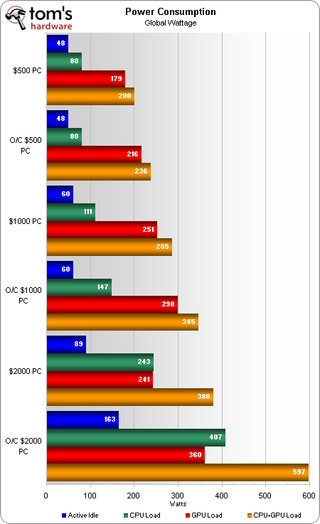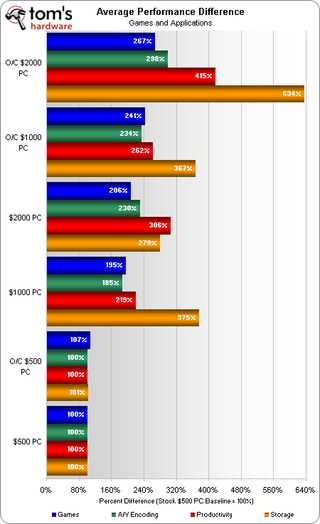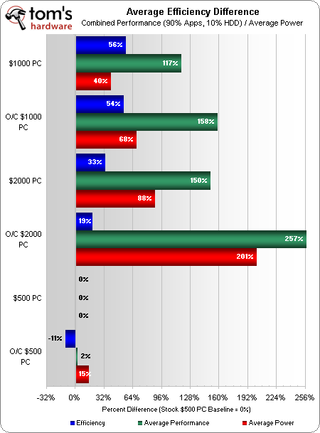System Builder Marathon, August 2012: System Value Compared
Power And Efficiency

Economy and efficiency are often two different things. Efficiency is a measurement of work per watt. Intel’s marketing department doesn’t always appear to realize the difference; we often find the term efficiency thrown around in discussions of its weakest products.
In today’s example, Paul's $500 PC consumes a lot more than half of the power of Don's $1000 effort. And yet, we already know from the benchmark results that it's not a lot more than 50% as fast. Really diving down is going to require some math in Excel.

The $2000 machine’s stock power consumption doesn’t look terrible, but the amount of extra juice required for its overclock is simply scary. This huge increase in consumption occurred in spite of our efforts to keep its core voltage relatively moderate, at 1.32 V.

We used the $500 machine’s performance as our baseline and instantly spotted a problem, as the $1000 PC produced far more than twice its performance. My system's numbers are even higher, though the delta between its performance and Don's $1000 system is much smaller.
Keeping the $500 PC as our baseline, we moved the chart scale to better reflect efficiency differences, rather than absolutes. After all, there is no such thing as 100% efficiency.

Paul's $500 PC boasts low power consumption. But it's power use isn't as low as its performance relative to the other machines, unfortunately. In fact, even my overclocked $2000 PC produces 19% more work per watt, in spite of its 200% higher average power consumption.
The $500 machine’s poor performance is almost completely responsible for the $1000 PC’s huge efficiency victory, though we have to give credit to Don's system's Ivy Bridge-based processor.
Stay on the Cutting Edge
Join the experts who read Tom's Hardware for the inside track on enthusiast PC tech news — and have for over 25 years. We'll send breaking news and in-depth reviews of CPUs, GPUs, AI, maker hardware and more straight to your inbox.
Current page: Power And Efficiency
Prev Page Benchmark Results: Productivity Next Page Breaking Down The Value Chart-
abitoms The statistician (really) in me wonders wat might have happened to the $500 system's value if a quad FX was used in it...Reply
I mean swapping the G860 for a FX 4100 and a Radeon 7770 *might'* have provided an interesting contrast to the above $500 system.
Productivity up by 20% and games down by 20% I guess. Can only speculate.
Btw, thanks crashman for the tip.
This is just me wondering aloud. So...dunno why the thumbs down -
Crashman abitomsdamn,.... thought there was an Edit button somewhere.(sorry)So adding to my prev comment, swapping the G860 for a FX 4100 and a Radeon 7770 *might'* have provided an interesting contrast to the above $500 system.Above your first post there's a link "Read the comments in the forums". In the forums you can quick edit (on the view pane) or full edit (on a new page), and in full edit mode you can even delete your second post. That is, if you add the missing information the the first post.Reply -
mayankleoboy1 Since the benchmarks give a fair weight to the 'pro' applications, GPGPU benchmarks should be there as well.Reply
And those gaming benchmarks are ridiculous. Most are getting FPS in the 100+ range. So really, there is no comparison between the systems. all values above 60 are the same. How can 150 FPS be better than 120FPS on a 60HZ monitor? -
Crashman mayankleoboy1How can 150 FPS be better than 120FPS on a 60HZ monitor?Hopefully it will go along with a maximum frame time drop from 500ms to 50ms :)Reply
-
I know it's probably hard to do, but it would be awesome if Tom's could find out the price where price/performance is optimal instead of searching for the optimal build for a set price.Reply
-
frihyland Great article, seems like it might be time to switch up the price points for your builds though. $600, $1200, and $1800 seem much more reasonable and would give us better comparisons I think.Reply
Edit: Ninja'd by chmr -
perishedinflames frihylandGreat article, seems like it might be time to switch up the price points for your builds though. $600, $1200, and $1800 seem much more reasonable and would give us better comparisons I think.Edit: Ninja'd by chmrReply
current price-tags feel awkward i have to agree.
to be more specific:
a. Entry level gaming pc ($500): you try to pick the cheapest parts so that you save for the best GPU the rest of your money can buy
b. Enthusiast gaming pc ($1000): how most people try to build, save here and there (either by finding good deals or by dropping quality in RAM and Chassis mostly) so that you can get an awesome CPU & GPU (prolly a SSD too)
c. Hardcore gaming pc ($2000): the tag is too high so you just blindly buy the most expensive parts (like a sheikh on vacation)
what would show more accurate results might be one of the following two:
1. two builds; one of $700-$800 and one of around $1500 (+/- $100)
2. three builds again but with some $150-$200 offset; entry-lvl 650-700, enthusiast 1200-1400, hardcore 1700-1900
-
noob2222 abitomsThe statistician (really) in me wonders wat might have happened to the $500 system's value if a quad FX was used in it...I mean swapping the G860 for a FX 4100 and a Radeon 7770 *might'* have provided an interesting contrast to the above $500 system.Productivity up by 20% and games down by 20% I guess. Can only speculate.Btw, thanks crashman for the tip.This is just me wondering aloud. So...dunno why the thumbs downToms did a bunch of game reviews showing how bad AMD is so they don't have to use them for the SBM articles. 11 of the past 12 SBM have all been Intel, and the one AMD was bugged with a cheap cpu.Reply
Even though SBM was I thought to test hardware with different components, apparently as long as its only with Intel.
BF3 as a test needs to be done online, wether its controlled or not, you can at least get a feel of how its going to work. Especially with a dual core cpu. -
Crashman noob2222Toms did a bunch of game reviews showing how bad AMD is so they don't have to use them for the SBM articles.Nice conspiracy theory, but I'm not party to it. So, go back to bugging the $500 and $1000 PC builders. They must know something I don't.Reply
Most Popular


